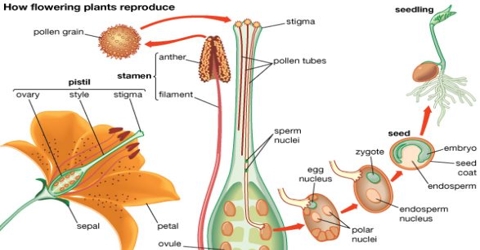Plants produce fruits and seeds following pollination and fertilization. But, there are other ways fruits and seeds are produced. Parthenocarpy is the formation or development of fruit without fertilization. Apomixis, on the other hand, is the formation of seeds without fertilization. Let us understand more about each of the phenomenon.
Suggested Videos
Parthenocarpy

Image Source: qsstudy.com
As mentioned above, parthenocarpy is a phenomenon by which fruits are developed without the process of fertilization. The difference between the fruits developed naturally and through parthenocarpy is that the fruits formed through parthenocarpy are seedless. They are known as seedless or virgin fruits.
Parthenocarpy is a form of asexual reproduction seen in flowering plants. It is found naturally in plants like banana and can also be induced artificially using growth regulators. Parthenocarpy is being increasingly used to produce seedless fruit varieties today because of the high quality and consistency in the yield.
In parthenocarpy, the ovary is stimulated even without pollination and thus fruit development begins without fertilization. This is common in plants that have no ovary or plants that have lost their ability to reproduce sexually due to a mutation.

Seedless Watermelon (Image source: differencebetween)
Browse more Topics under Sexual Reproduction In Flowering Plants
- Endosperm Development
- Fertilization and Post Fertilization Events
- Gametogenesis in Plants
- Morphology of Flower
- Outbreeding Devices and Pollen Pistil Interaction
- Pollination
- Seeds and Fruits
- Sexual Reproduction
Apomixis
While parthenocarpy is the formation of fruit without fertilization, apomixis is the formation of seeds without fertilization. In a natural flow of biological processes, pollination is the first step in the formation of a fruit and seed. The subsequent steps include cell divisions and fertilization.
But, in this case, there is no meiotic division and fertilization of the gametes to form a zygote. The entire process is cut short and seed formation occurs by the way of apomixis. It can be of two types:
- Sporophytic – In this type, apomixis occurs from the diploid sporophyte
- Gametophytic – In this type, apomixis occurs from the haploid gametophyte
Since apomixis involves the formation of seeds without syngamy, all the seeds are genetically similar. Therefore, it can be used in vegetative propagation.
Learn more about Seeds and Fruits here in detail.
Similarities and Differences
We have understood about parthenocarpy and apomixis individually, but let us understand the similarities and difference between the two.
Similarities
- In both apomixis and parthenocarpy, there is no fertilization involved. So, both produce offsprings similar to parents. In both cases, there is no chance of diversity in genes.
- Since both the types of phenomenon do not involve fertilization, they are both used as asexual means or vegetative propagation methods. Though both methods are asexual, they still use the sexual organs of the plant- the ovary and the ovules.
Differences
- Both apomixis and parthenocarpy are asexual modes of reproduction, apomixis is the formation of seeds whereas parthenocarpy is the formation of fruits without fertilization.
- Apomixis produces genetically identical mother cells whereas parthenocarpy produces genetically identical offsprings.
- Apomixis is seen in angiosperms and gymnosperms but parthenocarpy is seen in plants and animals. Parthenocarpy in animals is called as parthenogenesis. Learn more about Endosperm Development here.
Solved Example for You
Q1: Which of the following fruits undergo parthenocarpy naturally?
- Apple
- Mango
- Banana
- Plums
Sol. The correct answer is the option ”c”. Fruits like Banana, fig, pineapple, grapes, and oranges show parthenocarpy naturally as well. Today, in order to get seedless varieties of fruits, they are being sprayed with hormones to simulate parthenocarpy and give rise to seedless fruits.






Leave a Reply